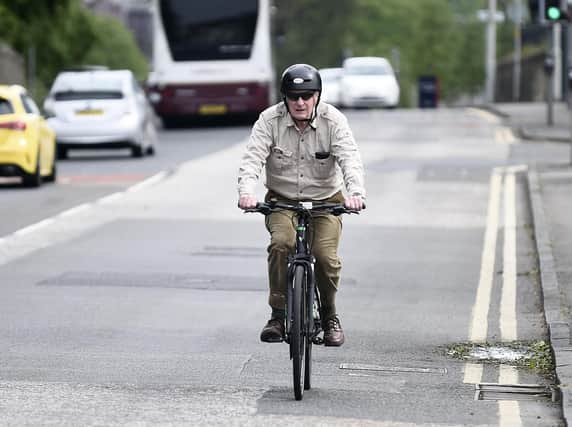Return to car use in Edinburgh 'is not inevitable' after lockdown says city's climate commission


A RETURN to car use because of physical distancing is not an inevitable part of life after Covid, leaders of the Capital’s independent climate commission have insisted.
Despite a dramatic drop in emissions during lockdown, there are fears that as more people return to work they may be reluctant to use public transport because of physical distancing and are more likely to opt for the car.
Advertisement
Hide AdAdvertisement
Hide AdBut commission chairman Dr Sam Gardner said: “I certainly don’t think it’s inevitable.”
And he urged the city to build on the measures it had already taken to encourage walking and cycling.
“Over the course of the lockdown we saw an incredible explosion in active travel and willingness and enthusiasm of people to move around Edinburgh using bikes particularly.
“We need to make the cycling or walking option the attractive option and the infrastructure we’ve put in we don’t take back out again.”
Advertisement
Hide AdAdvertisement
Hide AdHe said in the absence of such infrastructure there was “a high risk we see a V-shaped emissions bounce”.
And council leader Adam McVey, vice-chair of the commission, said people had nothing to fear from getting back on Edinburgh’s buses and trams.
“The message we have to get across is there is capacity on public transport, services are returning to closer to normal and operators like Lothian Buses, tram and other providers have taken a lot of measures to make sure those journeys are safe.
“If people on buses are wearing a mask there is nothing to make that journey a threat to their health as long as they are following advice and guidance.
Advertisement
Hide AdAdvertisement
Hide Ad“People will not find it a crowded, hemmed-in-like-sardines experience.”
The comments came as the commission, set up in February, published a report on Edinburgh’s green recovery from the pandemic.
He said: “Covid-19 has shown the power of common purpose; we must now seize the moment created by the devastating pandemic to tackle the climate emergency and secure a fairer more sustainable future for this city and its people.”
The report says that to achieve the target of being a net-zero city by 2030, the reduction in emissions needs to be accelerated across a range of sectors, particularly travel and heating.
Advertisement
Hide AdAdvertisement
Hide AdThe way buildings are heated contributes over 40 per cent of Edinburgh’s climate emissions, the report says. It proposes district heating networks and small-scale heat pumps to help move the city from gas to renewable sources for heat.
And it urges a concerted programme to retrofit buildings with energy efficiency measures.
The report also calls for more focus on local areas within the city to create “net zero neighbourhoods” where every community in the city has access to “the local services and places it needs” and the need for travel into the city centre is reduced.
Other proposals include “rapid electrification of motor vehicles” and the roll out of universal electric vehicle charging networks; derelict and underused land turned into community green space; and a city-run investment fund to provide seed capital for start-ups that support climate mitigation and adaptation.
Comment Guidelines
National World encourages reader discussion on our stories. User feedback, insights and back-and-forth exchanges add a rich layer of context to reporting. Please review our Community Guidelines before commenting.